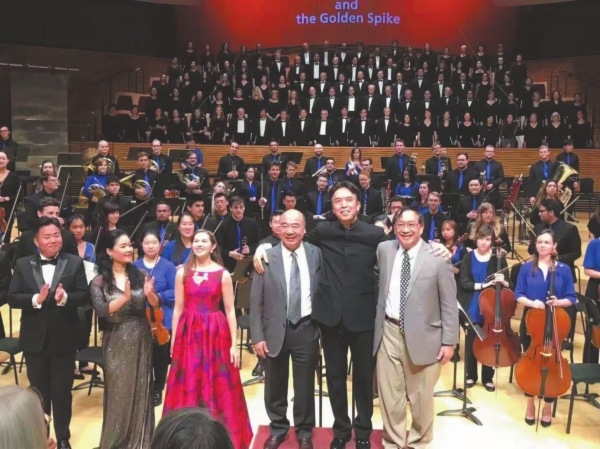
A photo of the main creative personnel of "Men of Iron and the Golden Spike". [Photo provided to Zhongshan Daily]
A symphonic oratorio titled "Men of Iron and the Golden Spike", created by famous US-based Zhongshan writer Su Wei and composer Zhou Long, was premiered in the Carnegie Hall in New York on October 1 and Stanford University in California on October 6.
The oratorio, with many elements of Zhongshan culture, tells the miserable past of Chinese workers in constructing the Pacific Railroad in the US.
This year marks the 150th anniversary of the completion of the Pacific Railroad, main writer Su Wei said. He hoped to commemorate the overseas Chinese ancestors with this oratorio and convey their pioneering spirit and fearlessness of danger to the contemporary audience.
In order to build the land passages connecting the eastern and western US, the US government decided to begin the construction of the Pacific Railroad in 1863. The railway was more than 3,000 kilometers long and opened to traffic in 1869. Almost 20,000 Chinese workers participated in the construction of the project.
In 1984, the government of Orange County, California, at a wine party affirmed the historical achievements of Chinese workers in the project a hundred years ago for the first time. Su Wei, a Chinese student at the University of California, who witnessed the moment at the scene, got interested in this history. In less than two years, he completed a stage play and named it "Men of Iron and the Golden Spike".
In 2013, Professor Gordan Chang from the History Department of Stanford University and conductor Cai Jindong got in contact with Su Wei. The three of them hit it off and decided to stage the play in the form of symphonic oratorio. Famous composer Zhou Long took charges of the composition of the piece.
"I hope to encourage the people of today to face the difficulties in life and live up to the demands of the present era with the pioneering spirit of our ancestors who are fearless of hardships," said Su Wei.
Police Registration Number: 44200002442868
Website ID: 4420000052
Sponsored by: Office of Zhongshan Municipal People's Government
Technical Support: Information Center of Zhongshan
Without written authorization from Zhongshan Municipal People’s Government, the content of the site shall not be republished or used in any form.
About Us | Site Map| Privacy Statement| Contact us
